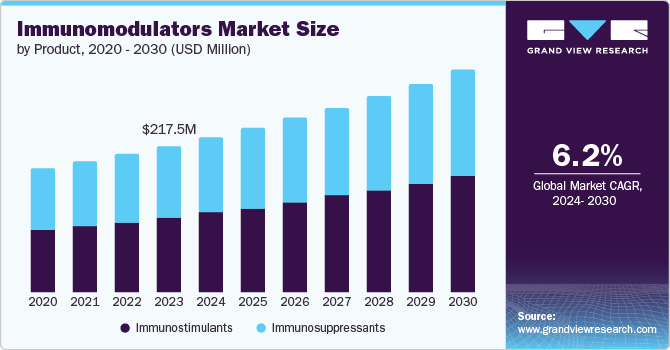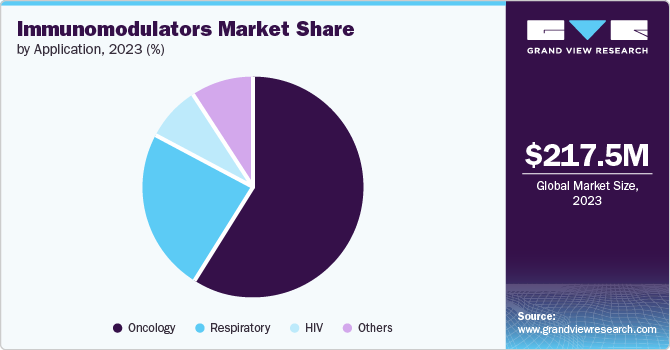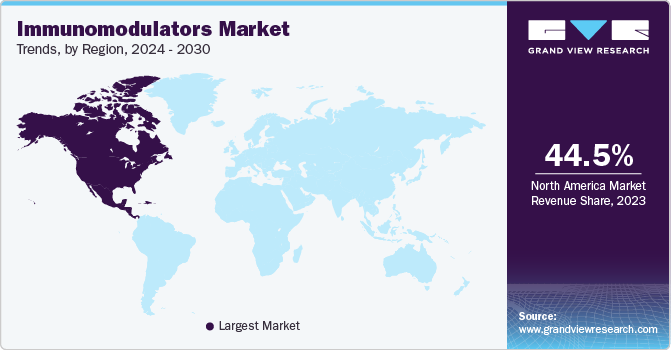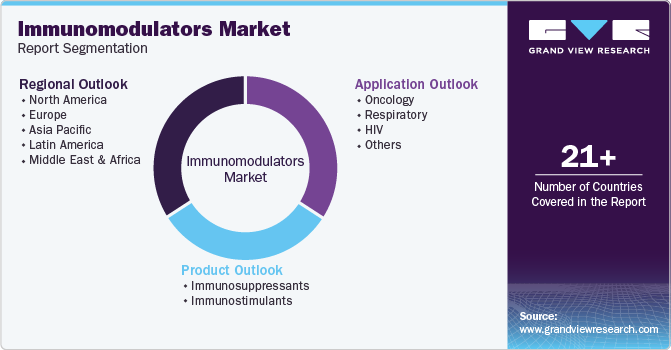Immunomodulators Market Size & Trends
The global immunomodulators market size was valued at USD 217.5 million in 2023 and is projected to grow at a CAGR of 6.2% from 2024 to 2030. The increasing prevalence of autoimmune and inflammatory diseases, advancements in biotechnological and pharmaceutical research, and the growing awareness about these therapies are contributing to the expansion of the market. Additionally, the rise in healthcare expenditure and the growing demand for effective therapeutic treatments are further propelling the market growth.

The rising prevalence of post-COVID complications has contributed to a significant expansion in the immunomodulator market. A recent study revealed that respiratory complications following COVID-19 have spurred the development of immunotherapies due to the scarcity of vaccines. Immunoglobulins, convalescent plasma, polyclonal and monoclonal antibodies, and immunomodulatory agents are critical therapeutic options in the absence of specific COVID-19 vaccines or medications. These conventional practices aim to boost the host's immunity against the virus.
Furthermore, there are significant unmet clinical needs for immune disorders and rheumatoid arthritis treatment, making immunomodulators key drivers of this market. Immunotherapies are expected to gain more popularity in the future due to their minimal side effects compared to existing medications. At the same time, the need for treatment for rheumatoid arthritis as few and limited to mostly TNF-inhibitors is expected to open up this sector for a wealth of growth opportunities. Besides, the side effects attached to TNF inhibitors and the high cost of therapy that comes with immunologic therapy per year, compounded with the poor access to insurance coverage, enhance the activity in the formulated immunotherapeutic agents.
The market is expected to grow significantly due to the rising use of immunomodulator therapy to be used in the early treatment for the management of Crohn’s ailment. Advancements in immunomodulatory therapy have led to decreased instances of organ rejection and improved ease of remission, making the treatment more advantageous. The increasing prevalence of Multiple Sclerosis is also contributing to this trend. Furthermore, the growing number of approved biological response modifiers is expected to result in the development of more precursor products. Consequently, the immunomodulators market is projected to experience significant growth, primarily fueled by the increasing number of clinical trials for immunotherapeutic substances such as laquinimod, ponesimod, and ozanimod, which are being designed for the management of multiple sclerosis.
Product Insights
Immunostimulant products accounted for a revenue share of 50.3% in 2023. This dominance can be attributed to their widespread use in treating a variety of diseases, including cancer and infectious diseases. Their effectiveness in enhancing the body’s natural defense mechanism has led to their increased adoption, contributing to their significant market share.
On the other hand, the immunosuppressants segment is also expected to grow at a significant pace, with a CAGR of 5.6% from 2024 to 2030. This growth is likely driven by their use in preventing organ transplant rejection and treating autoimmune diseases. The increasing prevalence of such conditions and the need for effective treatment options are expected to fuel the growth of this segment in the coming years.
Application Insights
Oncology applications accounted for the largest market revenue share of 59.2% in 2023. This can be attributed to the growing focus on utilizing immunomodulatory agents in cancer treatment. These agents have shown promising results in boosting the immune response against tumors and preventing immune escape, ultimately activating the immune system to identify and combat cancer cells. Consequently, there has been a surge in demand for these agents, driving their market growth within the oncology application segment.

Respiratory applications are anticipated to grow at a significant CAGR of 6.1% from 2024 to 2030. This growth is driven by the increasing use of immunomodulators to address conditions such as asthma, rheumatoid arthritis, Alzheimer's, epilepsy, and dementia, which are all impacted by chronic inflammation. Immunosuppressive drugs are being utilized to modulate the immune response in order to combat these diseases effectively.
Regional Insights
North America immunomodulators market dominated the market in 2023. This dominance can be attributed to the increasing number of chronic disease cases. This increased incidence has propelled the demand for immunomodulators, consequently driving market growth and expansion within the region.

U.S. Immunomodulators Market Trends
The U.S. immunomodulators market dominated the North American market with a revenue share of 79.3% in 2023. This can be attributed to the heightened focus on research and development in the field of immunomodulators, resulting in an expanded array of treatment options for patients. The market has experienced growth due to heightened purchasing power and increased health consciousness among consumers, leading to an increased demand for immunomodulators.
Europe Immunomodulators Market Trends
Europe captured a significant market share in 2023. Rising awareness of chronic diseases and changing patient preferences toward increasing the usage of immunomodulators have increased the market growth in the region.
The UK Immunomodulators market is expected to grow rapidly in the coming years due to the better improvement in products that have been beneficiary in treating chronic diseases and have helped grow the market in the region.
Asia Pacific Immunomodulators Market Trends
The Asia Pacific Immunomodulators market is anticipated to witness significant growth. Rising awareness, increased purchasing power, and government initiatives in the countries of this region have been factors in the growth of the market in the segment.
Japan Immunomodulators market is expected to grow rapidly in the coming years due to a rise in the elderly population and growth in chronic cases, which has led to increasing funding for research and development for production and increasing demand in the country market.
Key Immunomodulators Company Insights
Some of the key companies in the global immunomodulators market include Pfizer, Johnson & Johnson, Abott, Biogen, and others. Organizations are focusing on increasing their customer base to gain a competitive edge in the industry. Therefore, key players are taking several strategic initiatives, such as mergers and acquisitions and partnerships with other major companies.
Key Immunomodulators Companies:
The following are the leading companies in the immunomodulators market. These companies collectively hold the largest market share and dictate industry trends.
- F. Hoffmann-La Roche Ltd
- Amgen Inc.
- Abbott.
- Johnson & Johnson Services, Inc.
- Novartis AG
- Eli Lilly and Company
- Bristol-Myers Squibb Company
- Merck & Co., Inc.
- Biogen
- Pfizer Inc.
Recent Developments
-
In March 2024, Ability Biologics concluded its seed funding, securing a total of USD 18 million in investment. This capital is expected to be directed towards the development of innovative and highly targeted immunomodulators.
-
In December 2023, Odyssey Therapeutics, a biotechnology company specializing in the development of advanced precision immunomodulators and oncology therapies, successfully raised USD 101 million in a Series C funding round.
Immunomodulators Market Report Scope
|
Report Attribute
|
Details
|
|
Market size value in 2024
|
USD 230.5 million
|
|
Revenue forecast in 2030
|
USD 329.8 million
|
|
Growth rate
|
CAGR of 6.2% from 2024 to 2030
|
|
Base year for estimation
|
2023
|
|
Historical data
|
2018 - 2022
|
|
Forecast period
|
2024 - 2030
|
|
Quantitative units
|
Revenue in USD million and CAGR from 2024 to 2030
|
|
Report coverage
|
Revenue forecast, company ranking, competitive landscape, growth factors, and trends
|
|
Segments covered
|
Product, application, region
|
|
Regional scope
|
North America, Europe, Asia Pacific, Latin America, MEA
|
|
Country scope
|
U.S., Canada, Mexico, Germany, UK, France, Italy, Spain, Denmark, Sweden, Norway China, Japan, India, South Korea, Australia, Thailand, Brazil, Argentina, Saudi Arabia, UAE, Kuwait and South Africa
|
|
Key companies profiled
|
F. Hoffmann-La Roche Ltd; Amgen Inc.; Abbott.; Johnson & Johnson Services, Inc.; Novartis AG; Eli Lilly and Company; Bristol-Myers Squibb Company; Merck & Co., Inc.; Biogen; Pfizer Inc.
|
|
Customization scope
|
Free report customization (equivalent up to 8 analysts working days) with purchase. Addition or alteration to country, regional & segment scope.
|
|
Pricing and purchase options
|
Avail customized purchase options to meet your exact research needs. Explore purchase options
|
Global Immunomodulators Market Report Segmentation
This report forecasts revenue growth at global, regional, and country levels and provides an analysis of the latest industry trends in each of the sub-segments from 2018 to 2030. For this study, Grand View Research has segmented the global immunomodulators market report based on product, application, and region.

-
Product Outlook (Revenue, USD Million, 2018 - 2030)
-
Immunosuppressants
-
Immunostimulants
-
Application Outlook (Revenue, USD Million, 2018 - 2030)
-
Oncology
-
Respiratory
-
HIV
-
Others
-
Regional Outlook (Revenue, USD Million, 2018 - 2030)















